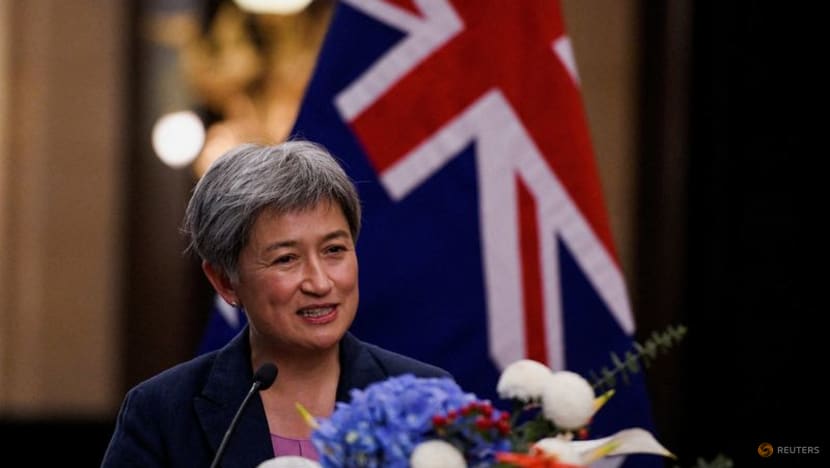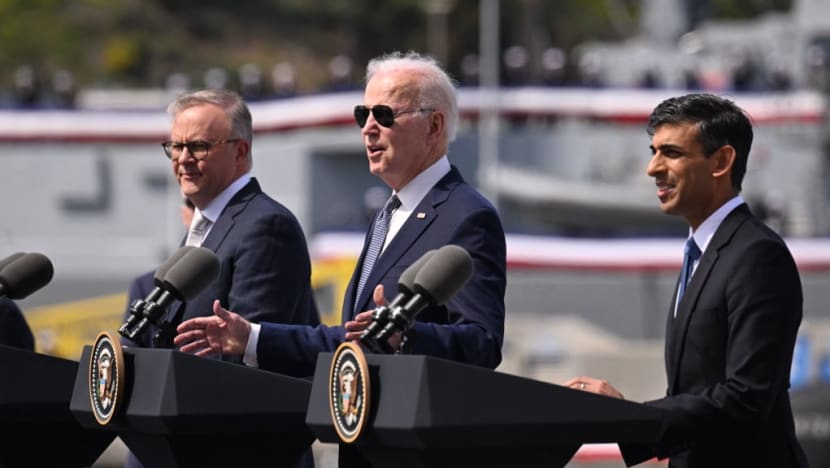Australia seeks AUKUS submarine deal to ‘better ensure a strategic equilibrium’, says Foreign Minister Penny Wong
“We seek to acquire this capability in order to help keep the peace,” said Ms Wong in the interview with CNA.

Australian Foreign Minister Penny Wong speaks during a joint news conference in Bangkok, Nov 1, 2022. (File photo: Reuters/Chalinee Thirasupa)
Australia is seeking nuclear-powered submarines to “better ensure a strategic equilibrium”, its Foreign Minister Penny Wong said on Tuesday (Mar 14), a day after a plan to acquire a fleet of up to eight such submarines was announced.
The leaders of the United States, Australia and Britain on Monday unveiled details of the agreement to provide Australia with the attack submarines, a major step under the 2021 AUKUS partnership aimed at countering China's naval dominance in the Indo-Pacific.
The deal is forecast to cost Australia up to AUD$368bn between now and the mid-2050s.
“We don't seek to acquire this capability to do anything other than to seek to better ensure a strategic equilibrium,” Ms Wong told CNA in a wide-ranging interview. She was responding to a question on how she would reassure neighbours amid concerns.
Explaining the motivation behind buying the nuclear-powered submarines, she noted that the country is a “middle power” like most of the countries in Southeast Asia.
“We seek to acquire this capability in order to help keep the peace. We want a peaceful, stable, prosperous region, as Singapore, as Malaysia, as Indonesia do,” she said.
She added that Australia is acquiring this capability “transparently”, pointing to briefings that the country has provided to regional leaders.
“We will provide more briefings. We will continue to talk with the region and listen to the region about any concerns they may have,” she said.
She stressed that the country “will never seek to acquire nuclear weapons”.
“What we are seeking to do is to replace an existing and ageing submarine capability with a new capability, which is nuclear propulsion, very different to nuclear-armed,” she said.
EFFECT OF GREATER AUSTRALIAN DEFENCE CAPABILITY
China’s mission to the United Nations, however, condemned the cooperation plan by the Western allies as a “blatant act that constitutes serious nuclear proliferation risks, undermines international non-proliferation system, fuels arms races, and hurts peace and stability in the region.”

Addressing a question on China’s views and the risk of greater Australian defence capability proving destabilising instead of stabilising in the region, Ms Wong reiterated the reason for acquiring nuclear-powered submarines.
“We want a region where no single country is dominated, (and) no single country dominates,” she said.
“I think people will see we are not a country that is seeking to escalate,” she added.
She noted that she has called for guardrails around the competition between the great powers.
Australia has also offered to brief Beijing, she added.
RELATIONS WITH BEIJING; PYONGYANG’S AGGRESSION
On how Australia will balance its long-term military strategy with its economic imperatives, which now involve repairing and restoring trade relations with Beijing, the country’s largest trading partner, Ms Wong said it is in both countries’ interests to remove trade impediments.
“We have said we believe it is possible for us to continue to grow our bilateral relationship if we manage our differences wisely,” she said.
She said that while Australia seeks to be clear about where its national interests lie and to make sovereign decisions about them, it aims to engage China in a way that is respectful, with recognition that Beijing has its own set of interests.
Ms Wong also said that continuing to ensure alliances among nations to reinforce stability is important in the face of the sort of behaviour from the North Korean regime. She was addressing South Korea's plan to step up engagement with the Quad – a partnership among Australia, India, Japan and the US – on the back of Pyongyang firing two short-range ballistic missiles on Tuesday.
“North Korea is a rogue state and has despite really widespread, virtually universal condemnation of its behaviours, continued down a very destabilising path which is destabilising for the region and what is destabilising for our region is ultimately destabilising for the world,” she said.
She also said that the Quad’s role in the region in the delivery of public goods for common benefit has been a very important development over these last years.
RELATIONS WITH ASEAN
Ms Wong also spoke about her plans to deepen economic engagement with the ASEAN region.
Given her commitment to increasing such engagement, she has asked Mr Nicholas Moore, the former CEO of Macquarie Bank to be the government's ASEAN envoy.
He will have to craft the ASEAN economic strategy for Australia, a report Ms Wong said she hopes to receive soon.
“I hope what we will be able to do as a consequence of that report is to really lift and leverage Australia's strengths in terms of our economic engagement with the region,” she said.
“If you look at economic growth, economic potential, population growth between now and 2030, and 2040, ASEAN is the key. We've always known it is central to the region. We're committed to that, but (ASEAN) will become even more economically powerful in the years and decades ahead,” she said.















